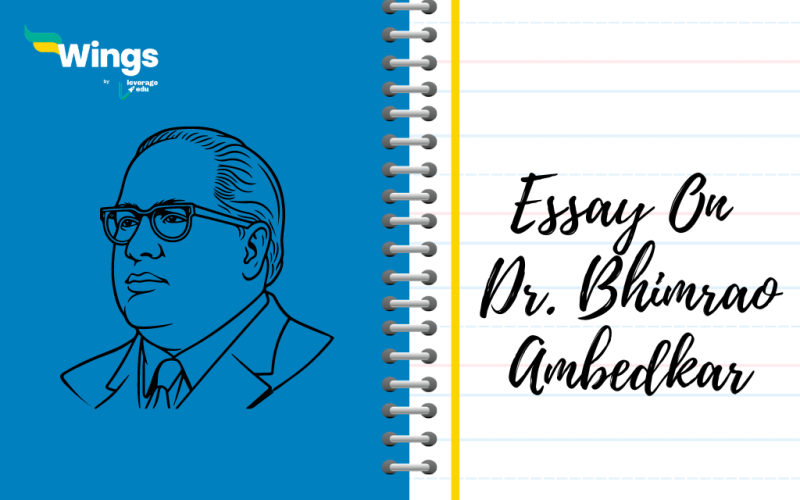Essay on Bhimrao Ambedkar: Dr Bhimrao Ramji Ambedkar, architect of a futuristic India, was a jurist, social reformer, and the founding father of the Indian Constitution. He was born on April 14, 1891, in Mhow, Madhya Pradesh. Throughout his early life, he faced profound discrimination as a member of the oppressed caste. Despite social and economic discrimination, Ambedkar has a legacy of rising from the margins of society to the forefront of the Indian freedom struggle.
He pursued education relentlessly, earning degrees from prestigious institutions like the University of Bombay and the London School of Economics. His academic achievements laid the foundation for his future role as a social reformer and legal luminary. Baba Sahab exemplifies his in-depth understanding of social justice and equality by drafting a trailblazing Constitution. As the chairman of the Drafting Committee, he played a crucial part in shaping the fundamental principles that govern the world’s largest democracy. Moreover, his commitment to justice, equality, and individual rights is evident in the constitutional provisions that seek to eliminate discrimination and promote social harmony.
Furthermore, Ambedkar’s insistence on including provisions for affirmative action, such as reservations for Scheduled Castes and Scheduled Tribes, reflects his foresight in addressing historical injustices. These measures were aimed at creating a more inclusive society by providing opportunities for historically marginalized communities to uplift themselves. His farsightedness continues to inspire movements for social justice and equality. The celebration of Ambedkar Jayanti on April 14th each year is a testament to the everlasting impact of his contributions to Indian society.
Before his role as the Head of the Drafting Committee of the Constitution of India, Baba Sahab had made significant contributions to India. He dedicated his life to eradicating the deeply entrenched caste system and untouchability. He persistently campaigned against social discrimination and fought for the rights of the oppressed. His influential role in the formation of the Bahishkrit Hitakarini Sabha in 1924 demonstrated his commitment to addressing the socio-economic issues faced by the oppressed classes and castes.
His efforts culminated in the historic “Mahad Satyagraha” in 1927, where he led a movement for the right of untouchables to access public water tanks. The burning of Manusmriti, an ancient Hindu legal text that legitimized the caste system, during the Mahad Satyagraha, symbolised Baba Sahab’s rejection of oppressive social norms. Thereafter, in his efforts to uplift the oppressed and marginalized communities, set up the Independent Labour Party in 1936.
Thus, Dr. B.R. Ambedkar’s life and work reflect the transformative power of education, perseverance, and a longstanding commitment to social justice. His journey from a discriminated member of society to the Father of India’s Constitution is a source of inspiration for generations to come. Ambedkar’s vision of a just and egalitarian society continues to guide the nation towards the ideals of liberty, equality, and fraternity.
Also Read:
| Essay on Patriotism |
| Ambedkar Quotes on Education |
| Social Reformist Jyotiba Phule: Biography, History, Facts |
Dr BR Ambedkar and Annihilation of Caste
As citizens of India, we must read “Annihilation of Caste” to understand the inherent discrimination in our society. This will help build a just and equal India for the future generations. This impactful work by Baba Sahab was initially a speech that remained undelivered. In later years, this written speech was published as a book. Here are some key details of this piece of text by the architect of the Constitution of India:
- Dr. B.R. Ambedkar was scheduled to deliver the speech “Annihilation of Caste” in 1936 as the presidential address for the annual conference of the Jat-Pat Todak Mandal, an organization formed to eradicate caste discrimination in India.
- In his speech, Baba Sahab ferociously criticized the caste system as a social evil. He propounded that this system perpetuates inequality and discriminates against a large section of society based on birth.
- Also, the speech is a powerful critique of the Hindu social order. This speech questions the legitimacy of the Varna system. Also, through this speech, Ambedkar challenges the orthodoxy that perpetuates caste divisions.
- Further, he emphasizes the urgent need for the annihilation of caste, as social progress and justice are impossible as long as the caste system continues to prevail.
- Moreover, he advocates for the conversion of untouchables to other religions as a means to escape the oppressive caste system. He later embraced Buddhism and encouraged his followers to do the same.
- Besides, Ambedkar also stresses the importance of meritocracy over hereditary privileges. He argues that we should build a society where individuals are judged based on their abilities and achievements rather than their caste background.
- Also, he focuses on the role of education in empowering individuals to challenge and overcome the barriers of caste discrimination.
Also Read:
| Women, Caste and Reform |
| Right to Equality (Article 14-18): Articles and Detail |
| What are Human Rights & Why are they Important? |
Also Read: How to Prepare for UPSC in 6 Months?
FAQs
Ans: Baba Sahab was born on 14 April 1891.
Ans: Dr. B.R. Ambedkar was scheduled to deliver the speech “Annihilation of Caste” in 1936 as the presidential address for the annual conference of the Jat-Pat Todak Mandal, an organization formed to eradicate caste discrimination in India. However, this speech remained undelivered.
Ans: Ambedkar Jayanti is observed on 14 April of each year.
Related Reads:
Follow Leverage Edu for more interesting topics on school education and essay writing.
 One app for all your study abroad needs
One app for all your study abroad needs













